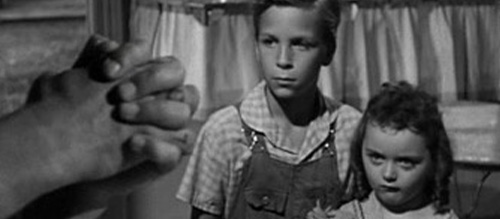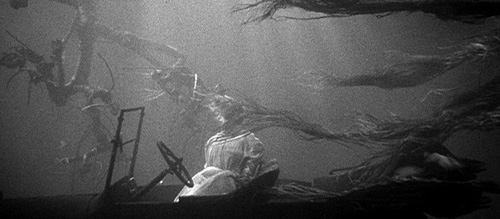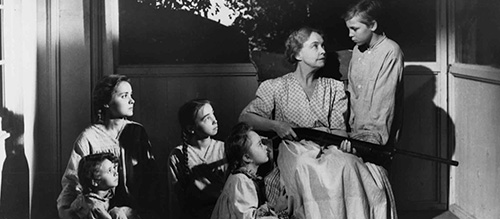How ‘The Night of The Hunter’ Highlights Religious Manipulation for Personal Gain
A nearly 70-year-old film which still feels uncomfortably poignant, Charles Laughton’s The Night of the Hunter presents us with a gruesome portrayal of a story which seems all too familiar: a self-professed holy man who moves in on unsuspecting believers to prey on the innocent.
In Depression-era Appalchia, preacher Harry Powell, portrayed in a chilling performance by Robert Mitchum, unapologetically marries, murders, and robs widows for his own gain, delusionally believing he’s carrying out the Lord’s will in doing so. While based on a book, the decision to make such a visually striking film adaptation of a story which focuses on a serial killing preacher was especially daring for the Hays Code era.
The film opens on a children’s Bible study which sets the tone, Rachel Cooper (Lillian Gish), the Bible teacher, quoting Christ himself: “Beware of false prophets which come to you in sheep’s clothing but inwardly they are ravening wolves.” Throughout the film, Powell regularly engages in “conversations” with the Lord, a form of exposition to give each of us a glimpse into his mindset, one that unfortunately is reflected in some capacity by many self-professed men of faith today. Powell has a deep loathing for women and their sexuality and doesn’t see issue with his committing acts of violence. He cites all of the killings of the unrighteous in the Bible as his justification; these people deserve what he does to them because they’re unrepentant sinners. An unorthodox man with “HATE” and “LOVE” tattooed across his left and right knuckles respectively, Powell presents himself as a humble, traveling preacher looking to simply spread the word of God. Instead, he manipulates people through their religious beliefs for his own personal gain, his focus on wealth, shame, and violence.

Ben Harper (Peter Graves), a blue-collar, struggling father of two commits armed robbery in which he murders two men and steals $10,000. He returns home to his two young children, John (Billy Chapin) and Pearl (Sally Jane Bruce), making them swear not to tell anyone where he hid the money before being taken to prison. Ben also makes John swear to look after Pearl, entrusting the money to him when he’s old enough. In this moment, John’s childhood is ripped away from him as he becomes the “man of the house.” He takes the promises he made to his father to heart, and speaks and acts with a unique, adult-like sincerity throughout the film. These qualities make him the primary antagonist to the sociopathic preacher Harry Powell, who all of the adults in town trust without question on nothing more than his claims to be a man of God.
Ben is sentenced to death by hanging, and while awaiting execution meets Powell in prison for stealing a car. Powell believes his bunking with Ben is a sign from God that he was meant to get the money by marrying Ben’s widow Willa (Shelley Winters) and promptly killing her and the children. Powell arrives in town shortly after Ben’s execution, quickly wooing Willa with false tales of his friendship with Ben as his minister in prison rather than his fellow inmate, and tells of how Ben had confessed that he threw the money into the river, easing Willa’s conscience about it. The rest of the townspeople have little to no qualms about the stranger who just rode into town overnight and made himself part of their community, specifically because he’s a preacher. Everyone is thrilled when Powell and Willa announce their engagement, viewing Powell as a reprieve to Willa as a struggling single mother. Pearl takes quickly to Powell as their new stepfather. John, however, doesn’t trust him, and finds himself at odds with Powell over the secret of where the $10,000 is hidden.
Powell uses his charisma and knowledge of the Bible to manipulate those around him. Though The Night of The Hunter pre-dates the rise of cults seen in the 1970s, many of those similar elements are present in Harry Powell’s preaching and ministering styles–humble and authentic when it’s convenient for him and holier than thou when it’s not. Any time someone doubts Powell, they’re reminded he’s a preacher, so surely he can’t have any ill intentions. It’s alarming to watch how quickly the people in the struggling Appalachian town develop the slightest bit of cult of personality around Powell. Perhaps if he weren’t so inclined toward his nomadic lifestyle, he could cause even more damage among the community than stealing from and murdering widows.
On their wedding night, Powell shames Willa for her sexuality, saying men and women should only have sex if they plan to have children and not for lustful reasons. Almost overnight, Willa takes Powell’s twisted preaching to heart. She is overcome with guilt and publicly blames herself at a revival meeting for Ben’s robbery and murder because she asked him for “worldly” things. From Powell’s perspective, the sin of men is due to the women around them, who seduce and influence them to do harm. Many religious belief systems have variations of this message, placing the burden on women to prevent men from sinning. Women and girls are inferior, yet paradoxically have tremendous amounts of power, as something as mundane as clothing can apparently lead a man to commit lustful sins.

Powell keeps pressing John about the money, and when Willa overhears him threatening Pearl, she knows the money wasn’t thrown into the river. Willa confronts him about this, and he kills her in the night, pretending she took the car and left him with her kids. To further embellish his story of a good-intentioned preacher trying to help a struggling mother, Powell tells people that she had rejected him on their wedding night, not the other way around. The following underwater shot of the murdered Willa tied to the car is haunting, especially as the slit in Willa’s throat is described as being “like she had a second mouth.” This veiled reference to Willa’s earlier profession of guilt for Ben’s crimes and almost taking up the mantle of preaching herself is reflective of the popular Christian doctrine that forbids women from preaching or having meaningful spiritual leadership roles within the church.
When comparing Harry Powell’s actions in The Night of the Hunter to those of cult leaders, the methods of control and abuse that cult leaders use are strikingly similar to those Powell uses against John and Pearl. His mood changes on a whim and largely depends on what he thinks he can gain from each situation. He knows being kind and friendly toward John won’t get him anywhere like it does with Pearl. Still, Powell exploits the siblings’ relationship by threatening John’s life to get Pearl to confess where the money is hidden – inside her ragdoll. The children manage to outrun him by taking their dad’s old boat down the river, living as orphan beggars until they’re taken in by the stern yet kind Rachel Cooper. Powell manages to track the children down, but Rachel refuses to give up John and Pearl, calling the police to have him arrested for Willa’s murder.

Rachel is a force to be reckoned with when she’s formally introduced in the third act of the film. She has already taken in several orphans, and doesn’t hesitate to house John and Pearl, protecting them from Powell. Representing what a true Christian should be, she’s able to respond to Powell’s cherry-picked Bible verses with biting ones of her own. The antithesis of the meek and mild womanhood often preached by religious men looking to control women, Rachel’s faith gives her the strength to stand against Powell and reveal his warped version of Christianity to the community.
For people who have been manipulated by faith leaders in such a personal way, it can often take years for them to even begin processing their trauma. Victims of cults such as Westboro Baptist Church, infamous for picketing funerals with vulgar and inflammatory picket signs, or Gloriavale, the insular commune in New Zealand, have only gone public with their stories after years of therapy and “deprogramming.” Even then, opening up is a struggle due to the deep relationships that came with being so isolated through shared traumatic experiences.
In one of the most striking and forward-thinking aspects of the film, John seems to have a post-traumatic stress reaction to watching yet another father figure being arrested. In his frenzy, the doll where the money is hidden splits open in front of the police. Again, during Powell’s trial, John can’t bring himself to testify against him as he’s reminded of his late father’s fate. Despite his crimes, Powell’s ability to integrate himself into people’s lives by manipulating their emotions runs deep, even with John, who never liked Powell in the first place. Yet, the few weeks Powell was his step-father deeply affected John and his trauma.
With its rare display of gray morality for the time, The Night of the Hunter challenges us to consider the trust put in faith leaders as well as how the concept of authority is presented to children. By manipulating people’s inherent trust in both religious and authority figures, Harry Powell is able to gain the trust of communities and murder more widows than he can count, a predator in plain sight searching for his next victim. He’s only stopped by a strong-willed, single woman who stands firm in her own faith and sees through his façade, finally ending his reign of terror.
Written by Nicole Sanacore
You can support Nicole Sanacore at the following links:
Twitter – @nicolesanacore
Instagram – @nicolesanacore
Website – nicolesanacore

